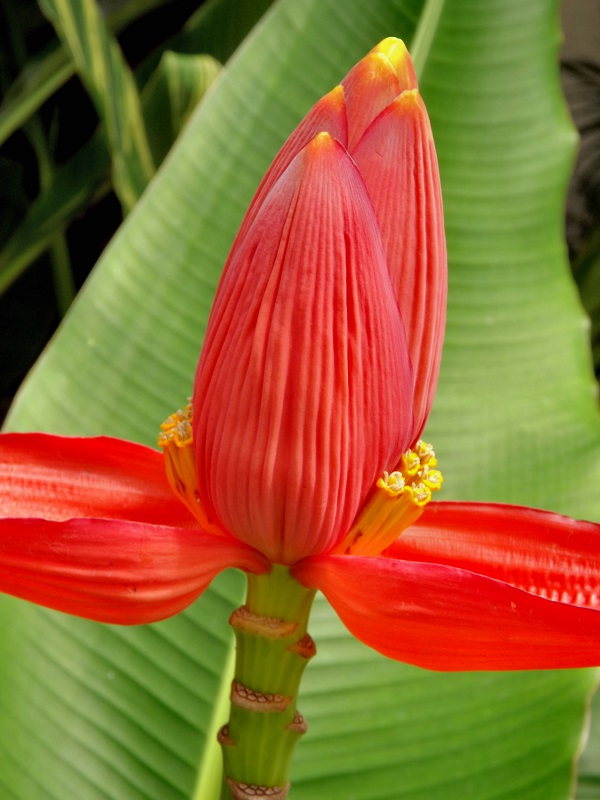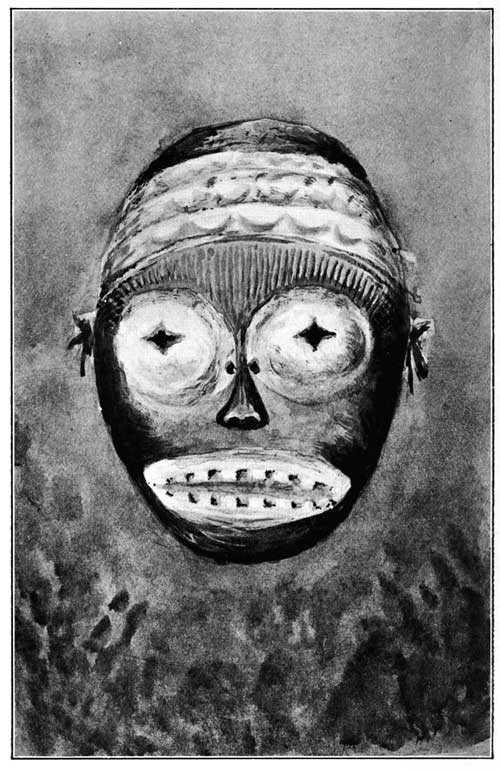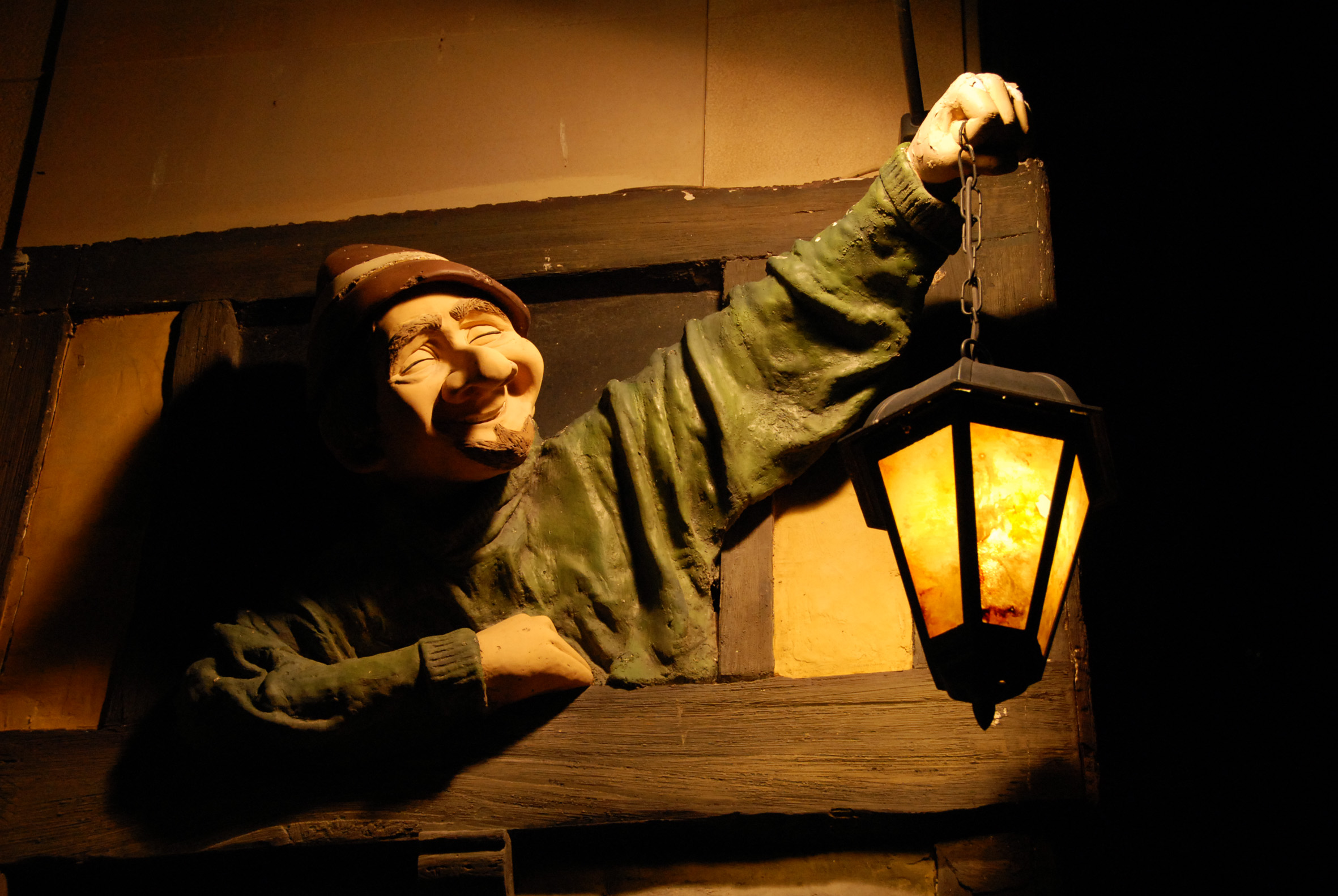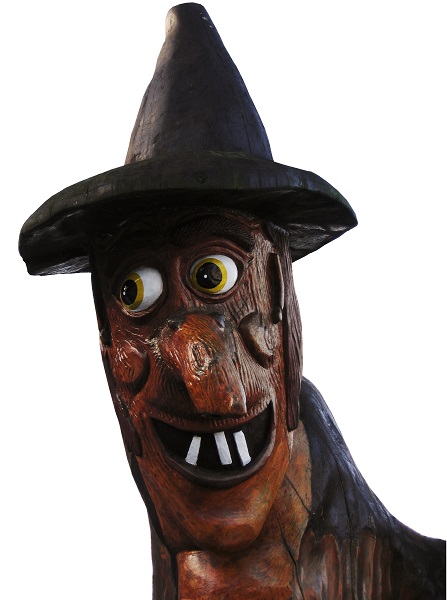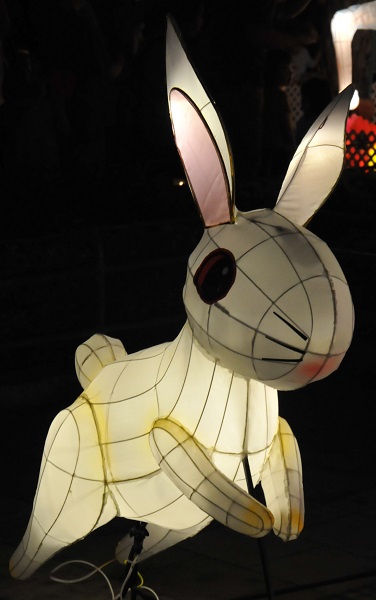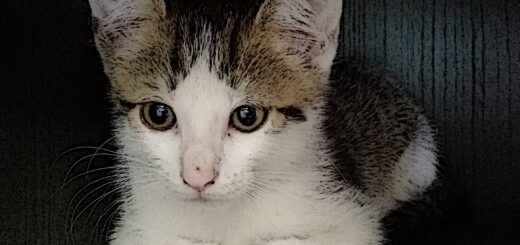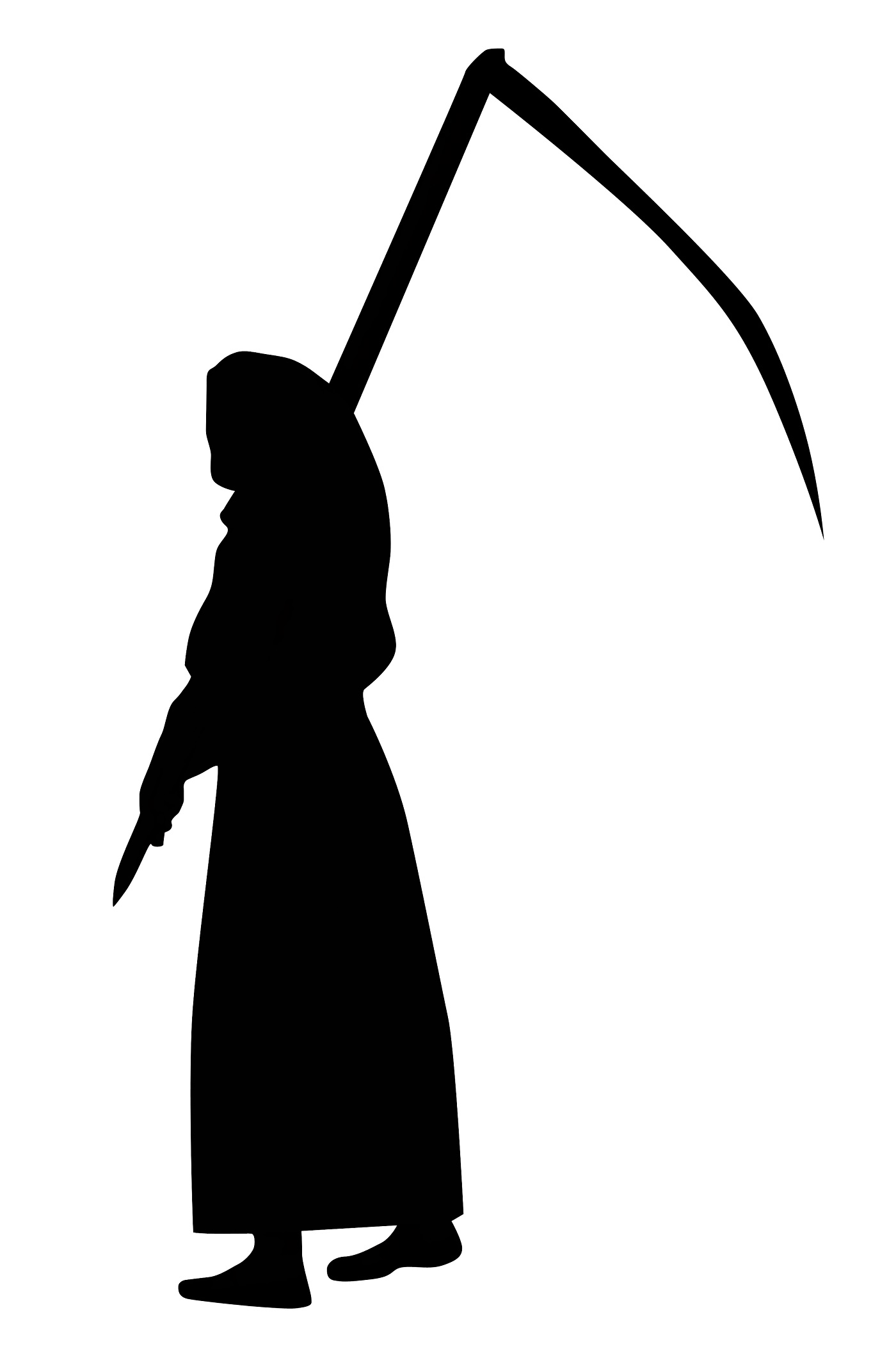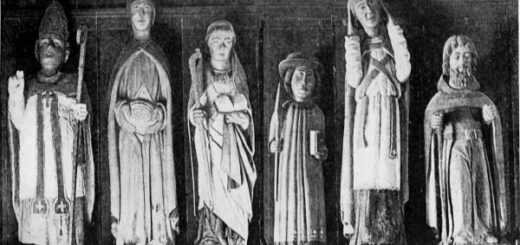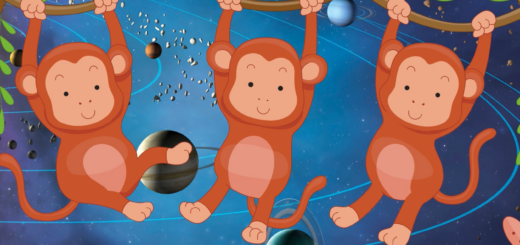THE TWO CHINAMEN (SHAN FOLK LORE STORIES, 1902) BY WILLIAM C. GRIGGS
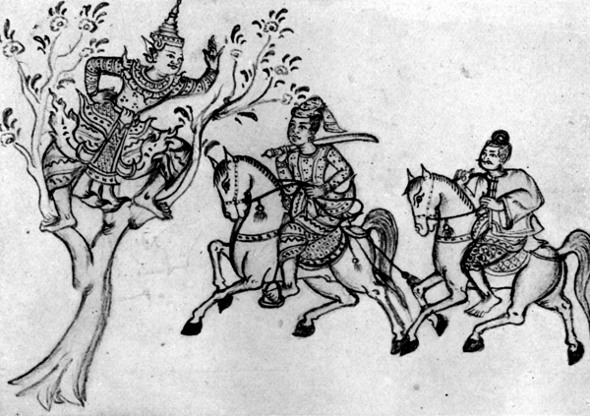
AGES ago, when this world was new, having been created but a short while, two Chinese boys left their native country and started out on their travels to discover things new and strange. After wandering for many days they came to the hill and water country where the Shans live. Here they found a monastery, where lived very wise and learned priests, who instructed them in many ways.
They lived here some time and won the esteem of the head priest to such an extent that he showed them a magic sword and bow that had lain in the monastery many years waiting for somebody to carry away. The law was that the man who could bend the bow or could draw the sword from its sheath should keep it.
The elder brother went to the sword and tried to draw it. He pulled, he tugged, he strained, till the sweat ran down his face, but in vain. He could not draw it out one inch.
Seeing the ill success of his elder brother, the younger thought it impossible for him to draw the magic sword, but at his brother’s command he took the handle in his hand and pulled with all his might. To everybody’s surprise out came the magic sword, and the Chinaman walked away in triumph.
The elder brother now made up his mind that if he could not get the sword he would try for the bow, and he might have more success with that, so he exerted all his strength, and slowly, slowly bent it, till the cord was taut and the bow all ready to shoot.
The people of the city were amazed that the two brothers should have such strength and good luck, and many envious eyes followed them as they again set out on their journey, carrying their trophies with them.
They traveled on and on till they gave up counting the distance, it was so great, till one day, as they were resting on the banks of a large river in a far country, they saw a great fish swimming in the water. It was so great that nobody heretofore had been able to catch it, and it was in fact the king of all the fishes. It broke all the nets and smashed all the traps. It snapped all the lines that were set for it, and nobody was strong enough to pull it ashore when it did take the hook. The Chinamen saw it, and the elder brother instantly strung his bow, put on a bolt, and shot the great fish as it was swimming in the shallow water. In a few minutes he had it on his shoulder, and they commenced to cross the bridge to the other side of the river.
Now the river was very wide, the current was very swift, and the bridge was not at all strong. It was only made of bamboos and rattan and swung from side to side as the men crossed it. When they got to the middle it began to creak and strain till the two travelers were in great fear it would break. The one who had killed it turned to his brother and said:
“O brother, the fish is so heavy I am afraid the bridge will break. Please draw your magic sword and cut it in halves, and then we will be able to get to the other side in safety.”
The younger brother therefore drew his sword and cut the fish in halves; but he did not yet know how sharp the sword was, for he cut the fish in halves, it is true, but not only that, but the whole bridge as well, so that his brother fell into the water and was immediately swept from his sight. On his part he could not of course cross, now the bridge was down, so he returned to the same side of the river and ran along the bank looking to see whether his brother would be swept ashore in some shallow place; but although he ran till he was exhausted and then traveled for many days by the side of the river through the jungle, he could discover no trace of his lost brother.
Swiftly down the stream his brother was carried. He tried to swim first to one bank and then to the other as the current swept him along, but in vain. At last he gave up trying. Nobody knows just how long he was in the water, but for many days he floated, and when he was on the point of dying from exhaustion, cold, and hunger, his feet touched bottom, and, more dead than alive, he crawled up the bank to dry land.
He found that he had landed near a garden, and, on climbing over the wall, he discovered that it belonged to the king. He was too tired to climb back again, however, so sank on the ground and the next instant fell asleep from sheer weariness.
Now it happened that the king of that country had just died, and his amats had taken out the royal chariot and were drawing it around the city looking for the proper person to become king. As they went along they saw this young man sleeping in the royal garden with his magic bow beside him. He had come from nobody knew where. He was so strong that the river even could not kill him. Above all, he had a wonderful magic bow which none of the amats or nobles could bend, so they came to the conclusion that he indeed was the man who should be king of the country, and he was crowned with great pomp and magnificence.
The other brother had been left standing on the bridge when the elder fell into the water, as we have said, and for many days he followed the river bank till he too arrived in a far country. It was a very strange country. There were no men there, only monkeys, but they were the very cleverest monkeys that ever lived, and were ruled over by a nang me prah, that is, a queen, just as men are ruled. This queen of the monkeys fell in love with the Chinaman and married him, so that he became king of Monkey Land. They built a palace for him on the top of the highest tree in the jungle. Every seventh day they brought him food. Some brought plantains, some mangoes, some rice, and some fish fresh caught in the river.
The elder brother had now been king of the country where he had landed for some years, and one day he remembered his younger brother, whom he had left standing on the broken bridge with the sword in his hand. He therefore called his amats and told them he was going on a long journey, and that they must rule well and justly till he returned. He then called his favorite servants and set out to discover his brother. They had a great store of provisions carried by coolies. He had his royal elephants, on which he could ride when traveling over the steep mountain roads and to carry his chief queens, and ponies for riding over the plains.
One night, however, he became separated from his followers and lost his way. He shouted and called, but shouted and called in vain. He could not find a trace of them. Servants, horses, elephants, and goods were all gone, and he was in great fear that he would die in the jungle. When morning broke he was much surprised to see that he had arrived at a city, but that the houses were all built on the tops of the trees, and on looking closer, he discovered that instead of people living in these houses the inhabitants were all large monkeys. Not a man was to be seen, and the monkeys were very fierce and screamed at him in anger from the top of every tree. One especially he noticed as being more fierce than any of the others, and he accordingly leveled his magic bow and shot it dead. As it fell from the tree to the ground he heard all the friends of the dead monkey come rushing out of their houses on the tops of the trees calling to one another that a man had killed one of their brethren, and asking that their friends would come to kill the man who had been guilty of the deed.
After a little time the king came to a tree that was taller than any other in the jungle, and upon it was a palace. Stairs led from the door of the palace to the ground, and as he looked more closely he saw a man up there. In great joy he called out to him, asking to be directed. “I am the king of a far country,” he said, “and I am on a journey to search for my brother, whom I have not seen for many, many years. Last night I lost my way. Will you take pity on me and show me the way and I will give you a great reward?”
“Who was your brother?” asked the man in the tree.
“He was a Chinese student,” returned the king, “and he had a wonderful magic sword. One day as we were traveling he cut a great fish in two, but such was the virtue residing in the magic sword that he not only cut the fish in halves but the bridge as well, so I left him standing on the end of the bridge.”
You may imagine how pleased the king was when he discovered that the man standing at the top of the tree was the long-lost brother for whom he was searching, and he made ready to ascend to his house in the treetop.
At that moment a little monkey ran down the tree toward him, and he kicked it aside, saying, “Out of my way, little monkey.”
The small monkey in great anger said: “I am not a monkey, but your nephew.”
“My nephew!” exclaimed the king in great astonishment. “What do you mean by that?”
His brother, the monkey king, then explained to him that he had married the queen of all the monkeys and that this was their child, that he ruled over all the monkeys, who had built this palace for him and every seventh day brought him tribute of food.
“I am sorry to say, then,” said the elder brother, “that I have killed one of your subjects,” and at the same moment the wife and son of the dead monkey approached their king.
“Our lord,” said they, “the man yonder has been guilty of a great crime. He entered the domains of our lord and although we did nothing to him, yet he raised his bow and killed one of the servants of our lord. Therefore our lord’s servants demand that he shall be killed too.”
“I am very sorry,” said the king of the monkeys, “that you have killed that special monkey. He was very clever and brave. He was also one of my chief amats, and his friends will assuredly kill you.”
The monkeys were now assembling by hundreds and calling to each other everywhere. Every treetop appeared alive with angry figures all calling for vengeance on the man who had killed their friend.
The king, however, who had taken sides with his brother, was not afraid, and said he could kill all the monkeys in the country; and he drew his sword and cut in halves the monkey nearest to him. To his great surprise, however, the two halves of the monkey he had killed each became a whole monkey and attacked him again, so that he now had two to fight instead of one. If he cut off the hand or leg of a monkey with his long sword, it immediately turned into two, and he soon saw that unless he devised some other way of fighting them they would soon kill them both.
He therefore rushed off to the jungle and got a great hollow bamboo. He then went to a bees’ nest and swept all the bees into it, and caught a great many scorpions and centipedes, snakes and spiders. When the monkeys came toward him to renew the fight, he opened one end of the bamboo and the insects and reptiles, swarming out, very angry at being kept prisoners in the hollow bamboo, soon drove the monkeys off so that the two brothers were able to escape. Shortly afterward they found the escort of the king and together returned to the city where the good elder brother made the younger his chief amat.
Now when the younger brother became amat, he of course saw what a great king his brother was. He saw his subjects kneel before him; he saw the royal elephants, oxen, horses, and buffaloes; he saw the riches in money, jewels, and goods that belonged to him; that his queens were the most beautiful women in the land; and he became jealous. Then he coveted all these things. The next step was easy; he determined to kill his brother and become king in his stead. Then he began to ponder and plot how best he could destroy the brother who had been so good to him. He did not remember how that same brother had left all these things to come and hunt for him; how he had given him riches and honor and position, so that now he was chief minister and next to him in power. No, he did not think of any of these things, but like the ungrateful man that he was, thought only that his brother had more than he.
He soon came to the conclusion that he could not kill his brother in the city, for everybody loved the king, and he feared that his crime would be discovered, so he was obliged to wait until they should be alone in the jungle together. The opportunity soon came. One day the king was out hunting and had gotten separated from all his followers. His brother the amat was a short distance ahead when he saw, just in front of him, a very deep hole, so deep in fact that it was impossible to see the bottom. In great excitement he turned and beckoned to the king as fast as he could, calling out in a loud voice that he had something very wonderful to show him.
The king thought that at least he had discovered a mountain of rubies and came running up. He knelt by the side of the hole but could see nothing.
“There is nothing down there,” said he.
“Let our lord lean a little farther over,” said the cunning amat. “He will then see the most wonderful thing in the world.”
The king bent farther over and his wicked brother gave him a push that sent him headlong to the bottom.
He had now succeeded in all his plans; he had reached the height of his ambitions, but although he became king he was not happy. He had trouble all the time. It is true he had his brother’s riches, that he rode the royal elephants, wore the royal robes, and lived in the royal palace, but he had trouble with his amats, with his soldiers, and his people, and therefore instead of being happy as he expected he would be, he was unhappy and miserable.
If he had only known what was happening in the jungle he would have been more anxious still. His brother was not dead as he thought. The fall to the bottom of the hole did not kill him and he was only a prisoner. His followers had all gone back to the city with his wicked brother. He called, but called in vain. He heard nothing but the echo of his own cries, and he was about to give up in despair, when it happened that the mighty Lord Sa Kyah coming through the jungle heard his cries and inquired the cause. The king did not know that this was the Lord Sa Kyah, but told him all that had happened. Lord Sa Kyah was very angry with the king’s heartless brother and created at the bottom of the hole a lily of the kind that has a very long stalk. The king sat upon the blossom of the lily which then began to grow very rapidly, and as it grew carried the king up toward the mouth of the hole.
As he gradually rose toward daylight he saw that a tree was growing at the very edge of the pit, and that some of the branches hung over. He saw also that a monkey was busily engaged in feeding on the leaves and fruit. The lily, of course, made no noise as it pursued its upward path; the king also kept quiet so as not to frighten the monkey, and when he was near enough suddenly put forth his hand and caught it by the tail. The monkey screamed and kicked, fought and scratched, but in vain; the king held on, and at last the monkey climbed down the tree taking the king with him, and the latter was speedily standing once more on solid ground and able to offer up his thanks to the mighty Lord Sa Kyah.
The king was not long in reaching the city and when he arrived, to his great sorrow he saw, as he expected, his ungrateful brother reigning, while the people all sorrowed for their old king. He determined to wait awhile before he declared himself, feeling that the Lord Sa Kyah who had already once helped him when in trouble and danger would aid him in regaining his lost kingdom; so he went into the poorest part of the city, put on the poorest and most ragged clothes that he could find, and sat near the gate of the city begging, from whence he often saw his brother riding by in state.
One day the heralds came riding by and stood in the open space fronting the market where the gambling booths are, and gave notice that the king had commanded that if anybody could bend the magic bow belonging to the late king, his brother, he was to be made the chief amat of the kingdom and receive many and great presents besides.
As may be imagined, the next day there was a great crowd gathered together at the great gate of the palace, waiting for the king. At last out he came with all his ministers and followed by attendants bearing golden umbrellas. Behind him came a soldier carrying over his shoulder the magic bow which was placed at the king’s feet. The king called upon his soldiers to come and bend the bow, and the strongest of them came forward, but although they pulled and tugged, tugged and strained, they could not bend it. Then the people of the city, or “the king’s people,” as they loved to call themselves in contradistinction to the people who lived in the jungle villages, tried, but met with no better success than the soldiers. They could not bend the bow. The king then ordered the amat löng to call the men from the jungle. The very strongest coolies, those who carried heavy burdens over the mountains, came in answer to the king’s summons, but although some of them could carry fifty soie over the highest mountain they could not draw the cord a hand’s-breadth.
The king, much disappointed, was about to return to the palace when a beggar man approached and bowing at his feet said he was able to draw the bow and fire an arrow from it. The king was angry at what he thought was the presumption of this beggar. The soldiers derided him, saying that the bravest of them could not draw the bow and how was a beggar to do it? The coolies also asked him whether he could carry fifty soie over Loi Mawk Pah that was called the Cloud Mountain, because its head was often in the clouds. But the beggar asked to be allowed to try and the king gave orders that he should be given the bow, at the same saying that he assuredly should be made amat löng if he was successful, but if he could not bend the bow, he should be put to death immediately.
The beggar assented to these terms and seized the bow. He took hold of the string and without any show of strength pulled it a hand’s-breadth, and then as the king and his courtiers looked on in amazement he pulled it to its full length, placed the string on the ivory trigger, put an arrow on it, and asked the king where he should shoot.
“Straight up into the air,” said the king. The beggar raised the bow, twang went the string, and the arrow whizzed out of sight. Everybody stood looking up into the sky when suddenly one of the courtiers gave a warning cry. It came too late. The arrow had gone straight up, turned, and fell almost on the same spot from whence it was shot. Almost, but not quite, for in its fall it struck the upturned face of the king and he fell dead.
A great cry was raised as the king fell and the guards rushed forward to seize the beggar and lead him to immediate execution, but he waved them off with a gesture of his hand. The next instant his rags fell from him and he stood before them in the royal robes of a king.
Thus we see that the younger brother, although indeed he had not murdered his brother the king, yet did kill him in his thoughts and intentions, and he suffered the punishment that is always meted out to the man who kills his fellow.
If you liked this story, leave me a comment down below. Join our Facebook community. And don’t forget to Subscribe!
